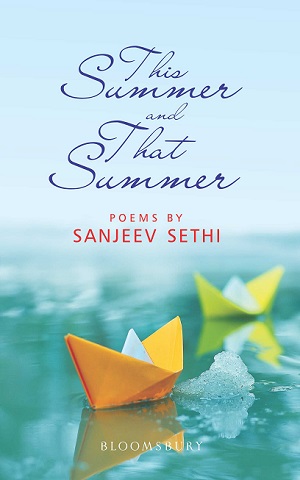 Poet Sanjeev Sethi reveals to the reader his most private self, as one leafs through This Summer and That Summer (Bloomsbury), his latest and third collection after Nine Summers Later (1997), which indeed went into print “nine summers after” Suddenly for Someone (1988). In these pages, populated with laconic verses packing phonetic and poetic punches, Sethi takes us neither through the humdrums of his media day-job, nor the vibrancy of Mumbai’s cityscape, but rather into the confines of his locked room, inside which he performs his most intimate activity: writing poetry.
Poet Sanjeev Sethi reveals to the reader his most private self, as one leafs through This Summer and That Summer (Bloomsbury), his latest and third collection after Nine Summers Later (1997), which indeed went into print “nine summers after” Suddenly for Someone (1988). In these pages, populated with laconic verses packing phonetic and poetic punches, Sethi takes us neither through the humdrums of his media day-job, nor the vibrancy of Mumbai’s cityscape, but rather into the confines of his locked room, inside which he performs his most intimate activity: writing poetry.
Although he does bring public elements into poems such as “Ascot” (“As a barfly I learned early to humor the waitstaff”), and “The Marketplace” (“To seek goodness on the street/is an unfair expectation”), Sethi’s work bears the mark of a man who calls it a night early to find comfort in the “coziness of covers” and “not in the bazaars/where bums and barmen,/shills and smithies/jostle for juice” (“The Marketplace”).
“In my world,” he writes, “there is no valley,/no rivulet nearby./Mind is the landscape.” His poems, sharing insights about the same realities from which the poet humbly resigns, dare us to ask the question: is one observational best, perhaps, in his most meditative? In the grouchy voice of a reluctant participant in the everyday, Sethi shares some googlies (or “curveballs”) such as:
In a conversation when you say,
“If you want me to be honest,”
It means you are about to lie. (“Capsules”)
Whereas when brought into contact with the outside world he is astute but brief, in his “living quarters,” however, his voice is feverish with alliterative back-and-forth, and swordfights with literary words. For instance,
Bathed in bounties of the elements
vacillating fronds blushed. On the corniche
your palm in mine, we were at a fork
parrying tines of the past,
begins Sethi in the ten-line, dextrously-handled and breathlessly-paced “Ruse.”
Other poems, in which he plays phonetic games almost in every turn of phrase, end with alliterative triumph, the poet proudly announcing the poem’s purpose. Examples: “The cheer from her bangles/indicating her innervations.” (“Realia”); “Fortitude is this friend’s flag.” (“Friendship”); “Only the terrestrial require titillation./Manes are migrants searching new swarms.” (“Post Death”) Critics of his previous work have alluded to this “muchness” of alliteration and assonance, to which the self-aware Sethi appears already to have the answer:
When you undress a poem with dignity,
delicately like a lover, it will disrobe you
of excess, accessing your inner feelings. (“Conduction”)
Mild-mannered, wry, and charming with his bursts of great affection and empathy, I enjoyed This Summer and That Summer the most in its presentations of his interactions with others. I particularly admired the poet for giving voice to his body, sometimes jokingly as in the poem “Capsules”:
I envy the arrogance of those who pee
with their hands on their waist.
Such fortune escapes most fat men.
and on other occasions rather movingly, as in ‘Rain’:
Sometimes, rain helps this wretched fellow.
On an evening out, after a couple
of tough ones, flub at the facilities
ensures my trouser is wet.
Potent as a wordsmith, a dry humorist and a tragicomic at once, Sethi skillfully manages his versatility.
The fifty-odd poems that make up This Summer and That Summer are excellent documents of Sethi’s telegraphic work, essential reading especially for emerging writers, who, in the veteran’s own words, “caress syllables to complete/the emptiness of [their] experience.”
* * *
Karthik Purushothaman is a Tamil-speaking writer of poetry and prose in English. He resides in Wayne, New Jersey, where he currently pursues the MFA in creative and professional writing at William Paterson University, and also serves as one of the readers of the journal Map Literary.












